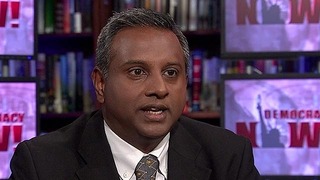
Egyptian American engineer Mohamed Radwan was arrested in Syria on March 25 and released April 1. Democracy Now! correspondent Anjali Kamat interviewed him in his family’s home in Cairo on April 5 and filed this report.
ANJALI KAMAT: Mohamed Radwan spent one week inside Syria’s notorious detention system, four days of which he was held in solitary confinement. Now back at his family home in Cairo, the 32-year-old Egyptian American engineer says that when he was inside, he had no idea how long his ordeal would last.
MOHAMED RADWAN: I started trying to prepare myself mentally for a much longer period, because I was quite aware that — of the infamous security forces in Syria. I mean, at this point, no one had told me either if I — I wasn’t accused of anything, but they weren’t giving me any news from the outside world. I was completely cut off.
ANJALI KAMAT: Mohamed was one among hundreds of Syrians and others arrested by the regime in recent weeks.
MOHAMED RADWAN: Well, there was a lot of Arabs there, and they weren’t all Syrian. I could tell either by their accents or by the guards asking to bring the Iraqi or whoever.
ANJALI KAMAT: Mohamed’s friends and family members organized demonstrations outside Syrian embassies in Britain, Egypt, Lebanon and the United States to secure his release. But inside his cell, Mohamed had no idea that anyone knew what was happening to him.
MOHAMED RADWAN: I thought I was going to have to work out getting out on my own. I was still not aware that anyone else — anyone in the world — had any idea about my detention.
ANJALI KAMAT: He explained the series of events leading up to his arrest.
MOHAMED RADWAN: On the day of my arrest or detention, I was at the Umayid Mosque. And it was Friday prayer, and I was sitting within the mosque listening to the sermon. And at that point, I heard a lot of commotion near the back entrance. And at one point, everyone just got up, just stood up and started heading towards back to the entrance. And automatically, everyone just pulled out their phones and started filming. I looked around me, and there was at least — at least — 30 different people just with their phones held up directed towards the group at the back, who had started to move out to the courtyard.
ANJALI KAMAT: At this point, Mohamed started filming and headed to the courtyard of the mosque.
MOHAMED RADWAN: I took a side, and I started tweeting. And I put out that one jumbled tweet, because obviously I was just — I knew it was probably better to get that done with really quick and to continue observing. And it was at that point that what seemed like an official walked up to me and asked what I was doing. He looked like an official because of his really bad suit, but also his attitude and — and I answered him. I said, “I’m sending out a message.” And he asked me to excuse myself and to go with him. And so, I ended up following him. And what ended up being a — they took me and a few other guys in a vehicle to some location. I’m not sure where that was. And this is the location that I spent the following week.
Later on that night, they asked me to sit in front of a video camera and discuss some things that — regarding my presence there in Syria. I mentioned going to Israel — however, that never happened — and taking money for photos — also did not happen.
ANJALI KAMAT: This was the so-called confession that was aired on Syrian television. Mohamed explained what he was made to say.
MOHAMED RADWAN: Well, I mentioned that I was in contact with an individual from Colombia and that eventually I went to Jerusalem and that I took money for photos.
ANJALI KAMAT: Mohamed says he was not tortured into making the false confession but adds that he didn’t really have a choice.
MOHAMED RADWAN: It was not an easy situation, in that the uncertainty of it all did bring a certain factor of fear into play. These guys were forceful in their manner, but no torture, no abuse or anything like that. I think if you’re in there, I mean, you have to do what they say, because they have their methods. I mean, they’re very persuasive people.
ANJALI KAMAT: Ultimately, Mohamed was not charged with any crime and released following sustained pressure from several fronts, including the Egyptian Foreign Ministry. This, he believes, is one of the tangible changes brought about by the Egyptian uprising.
MOHAMED RADWAN: Some of the positive signs is — and indications of moving in the right direction, is the Foreign Ministry in Egypt actually going out of its way to help citizens — just one citizen, to help him as much as they could possibly help him. This — we see this as a positive sign. It was not like this a few months ago before the revolution.
ANJALI KAMAT: Mohamed says he wasn’t politically active in Syria and still isn’t sure why he was targeted. He’s worried about those who remain in detention inside Syria but remains hopeful about what comes next for the Syrian people.
MOHAMED RADWAN: Well, I wish my Syrian brothers the best. I hope that in a democratic world, the majority gets their — gets what they want. They live in emergency laws — under emergency law. I mean, emergency laws take away fundamental international human rights. The current regime is discussing about taking that away. Let’s hope they’re serious about it.
ANJALI KAMAT: For Democracy Now!, I’m Anjali Kamat in Cairo, Egypt.











Media Options